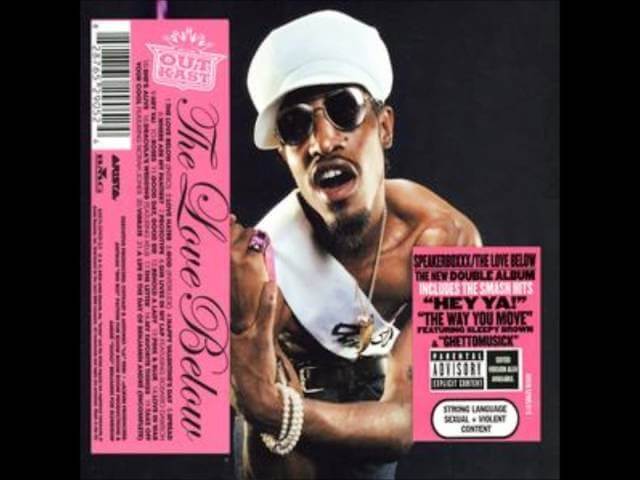With Speakerboxxx/The Love Below, Outkast heralded the decline of gangster rap

In We’re No. 1, The A.V. Club examines an album that went to No. 1 on the Billboard charts to get to the heart of what it means to be popular in pop music, and how that concept has changed over the years. In this installment, we cover Outkast’s Speakerboxxx/The Love Below, which went to No. 1 on October 11, 2003, where it stayed for two weeks. It reclaimed the position three more times over the next four months.
Gangster rap, the dominant paradigm in mainstream hip-hop since the release of The Notorious B.I.G’s 1994 album, Ready To Die, looked to be cruising along in fine form in 2003. The genre had just seen the birth of its newest star in Queens rapper 50 Cent, whose debut album for Interscope, Get Rich Or Die Trying was released in February. The album, promoted heavily by 50’s image as a hard-bitten survivor of nine bullet wounds, sold over 8 million copies and spent six nonconsecutive weeks at the top of the Billboard 200. In November of the same year, Jay Z released what was then billed as his retirement record, The Black Album, a masterful victory lap in which the rapper reflected on his criminal past with a twinned sense of nostalgia and regret. So as one New York gangster rapper retired, another rose in his stead and the cycle of gangster rap’s popularity (and New York’s undisputed place as hip-hop’s epicenter) looked as if it would continue anew.
But another album came out in 2003, one that presaged the opposite: The sun was finally starting to set on gangster rap’s long reign. The Atlanta duo Outkast released its fifth proper album, Speakerboxxx/The Love Below, on September 23, 2003. The double album spent three weeks atop the charts in 2003, and another four in 2004 and spawned two massive singles, “Hey Ya!,” and “The Way You Move,” two of the biggest hip-hop hits of all time. It went on to sell more than 11 million copies, and to shape the way hip-hop was both conceived and marketed.
In reality, Speakerboxxx and The Love Below were separate solo albums, and each represented a turn for rap, a parting of the ways for at least two strains of hip-hop that would reverberate for the next decade. Speakerboxxx, Big Boi’s contribution, was, for the most part, a traditional Outkast album, though without Andre 3000, it strayed closer to a single musical influence than the group’s records had in the past, crafting ultra-lyrical tracks on the back of P-Funk sampling beats. The Love Below, on the other hand, was hardly recognizable as a rap record—it was an emotional, often campy, concept album about the search for love, delivered by Andre, who at this point in his career was dressing like a mid-century British dandy and whose music had started to sound like the diametric opposite of traditional rap: vulnerable, expressive, and willing to explore new things.
Big Boi and Andre 3000 had long been iconoclasts, sometimes skeptical, sometimes outright contemptuous of the gangster posturing of their peers. Though casual gun talk on their debut album, Southernplayalisticadillacmuzik, made them difficult to separate from other criminally inclined rappers, they soon abandoned that narrative. On the title track of their 1996 album, Atliens, Andre explicitly rejected the signifiers of a crooked lifestyle:
“God works in mysterious ways so when he starts /
The job of speaking through us we be so sincere with this here /
No drugs or alcohol so I can get the signal clear as day /
Put my Glock away I got a stronger weapon /
That never runs out of ammunition so I’m ready for war, okay”
And yet, for all their stylistic and lyrical singularity, there was no real reason for those outside the world of hip-hop to separate Outkast from the pack, particularly since the group’s oddest hits didn’t make it particularly far on pop radio. Outkast’s 2000 album, Stankonia, broke through as its most commercial yet, with a single “Ms. Jackson,” making it to the top of the charts. But the album’s real gem, the wild, cagey “B.O.B (Bombs Over Baghdad),” was stymied, partly by its name—which scared off programmers—and partly by its breakneck rhythm and raucous guitar solo, just two of the many elements that made the song a foreign entity for even the relatively allowing hip-hop/R&B charts, where it peaked at No. 69.
After Stankonia, Andre 3000 and Big Boi didn’t so much drift apart as move decisively in different directions. After a brief stab at jumpstarting an acting career, Andre began to record new music in Los Angeles, dabbling directly in theatrical forms of funk, R&B, jazz, and pop. While Outkast, as a group, had always been comfortable partaking of a wide range of musical styles, its custom had been to allow those sounds to coalesce in the backdrop and in the beats. Regardless of how avant-garde the group’s music became, its songs were generally still recognizable as traditional rap. But as Andre started to record the songs that would eventually make it onto The Love Below, that changed.
It is clear to most listeners that hits like “Hey Ya!,” and “Roses” were somewhat post-hip-hop, structured around verses but ultimately emotional music rather than simple platforms for the usual verbal gymnastics. But even relatively minor songs on The Love Below seemed to tack on rap verses almost as afterthoughts, when they didn’t ignore hip-hop altogether.
 Keep scrolling for more great stories.
Keep scrolling for more great stories.
